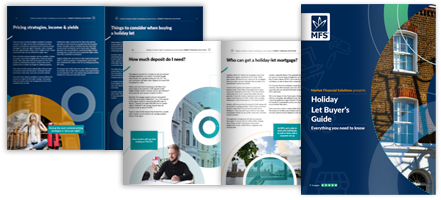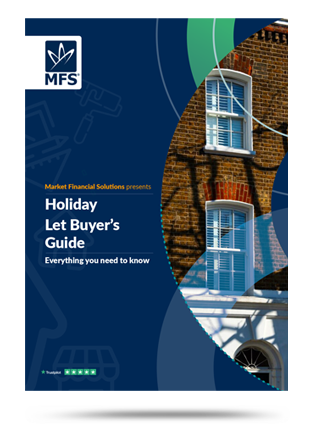
Written by Omkar Hushing
Deputy Chief Mortgage & Operations Officer – Front End
Market Financial Solutions are a bridging loan and buy-to-let mortgage provider and are not legal, financial, investment or tax advisers. This document is for informational purposes only and does not, and should not be considered, to constitute legal, financial, investment or tax advice or be relied upon by any person to make a legal, financial, investment or tax decision. Therefore, Investors are encouraged to seek appropriate professional advice. The information in this content is correct at time of writing.

Holiday-let businesses have become increasingly popular among property investors since the pandemic. It’s easy to see why. It’s possible to purchase a large property, convert it into several holiday-lets, and rent them out to eager holidaymakers for healthy returns. But, combined, the acquisition and conversion could run into the millions. Fortunately, there are several business loan options for holiday-let investors. Here, we’ll explore a few options for how to finance a holiday-let business.
Is a holiday-let a good investment?
The UK’s domestic tourism industry has experienced an uptick in activity since the start of the pandemic. Although, it was already in a position of strength before Covid-19 reared its head[1].
As to be expected, lockdowns damaged the staycation industry. However, as rules relaxed within the UK, the market began to thrive once again, whilst international travel restrictions remained in place. As we started to put the Covid years behind us, demand for staycations, surprisingly, remained high[2].
Property investors may be able to take advantage of this. Generally, short-term holiday lets can generate much higher levels of income than their traditional private rented sector counterparts[3]. Of course, it’s important to remember that these property types will often sit empty for long periods.
Cornwall, for instance, is a very popular location for holiday makers. But, while the region sees a notable uptick in visitors in the summer months, it often becomes a “ghost town” in the winter[4].
Despite challenges however, the competitive returns on offer, coupled with the buoyant state of the UK’s tourism industry and the prospect of more overseas visitors to Britain’s shores[5] are combining to create higher demand for holiday-let businesses.
What to consider when investing and how to finance a holiday let
Given the potential on offer, many property investors may be keen to make some purchases in the UK holiday-let market. They’ll also likely be wondering how to finance a holiday let. But these concerns shouldn’t be rushed. There are a few key areas investors should look into before considering a business loan for holiday-lets.
1) Location
Investors will often be looking for holiday-lets in rural areas. From the coastline of Cornwall, to the plains of the New Forest and hills of the Lake District, a popular location is essential if investors want to finance a holiday-let business.
2) Lender experience
With popular locations comes increased competition, however. Therefore, it’s important that investors work with lenders that have experience in working on cases in rural areas, or specific parts of the country. This becomes particularly important when valuing a property and underwriting a deal for a business loan for a holiday-let. Speed and flexibility are of the utmost importance.

Different types of business loans for holiday-lets
When the market sparked back to life in 2021[6], interest from investors naturally rose. Indeed, Market Financial Solutions has seen a higher number of enquiries from property buyers seeking business loans for holiday-let investments. But property investors wanting to finance a holiday-let business must think carefully about potential financial solutions.
Option 1: Buy-to-let mortgage
Our buy-to-let mortgage provides finance for short-term and holiday-let businesses, due to its bespoke approach to lending. Investors can borrow several million pounds over a 5 year term for a mortgage for a holiday let business, even in complex circumstances. What’s more, we have both fixed rates and trackers available to suit varying investment plans. No matter if they’re an individual or business, our buy-to-let mortgage can be tailored to their needs.
Option 2: Bridging loans
A bridging loan on the other hand, could also prove a viable financial solution – if only to facilitate a business loan to buy a holiday let. They provide the breathing space for property investors to arrange a longer-term financial solution, without the worry of missing out on an investment opportunity. Ultimately, the holiday let business model requires adaptability.
Option 3: Property refurbishment loans
Using specialist finance for property refurbishment is also a common use for business loans for holiday-let investments. After all, the décor and facilities must be first class to attract holidaymakers. Investors will often want to add specialist features or a touch of luxury to the property, which may result in additional refurbishment works.
Option 4: Large loans
We also see high demand for large loans among holiday let buyers. The reason? The investment can include the purchase of the property itself, the refurbishment and renovation of the property, or even a complete conversion. Have a look at this case study on how a large loan covered an impressive country manor and surrounding properties.
From the size of the loan to the nature of the property and its use, it takes a specialist lender like Market Financial Solutions to finance a holiday let business. For more information about how we can support property investors considering a holiday let investment, get in touch with our friendly team of experts.
The Complete Guide to
Holiday Lets
Everything you need to know
- What to consider
- Costs, pricing, income
- Rules & regulations
- Finance options
[1] https://www.independent.co.uk/life-style/pandemic-change-holiday-travel-staycation-b1930008.html
[2] https://www.traveldailymedia.com/staycation-demand-rises-73-with-travellers-unwilling-to-give-up-holidays-as-the-cost-of-living-rises/
[3] https://www.propertyinvestortoday.co.uk/breaking-news/2024/1/new-analysis-shows-huge-returns-on-properties-used-as-short-lets
[4] https://www.express.co.uk/news/uk/1844222/cornwall-pretty-uk-seaside-town-polruan
[5] https://www.thetimes.co.uk/article/us-market-driving-uk-tourism-boom-v5kz7q2sx
[6] https://store.mintel.com/report/uk-holiday-rental-property-market-report-2021





